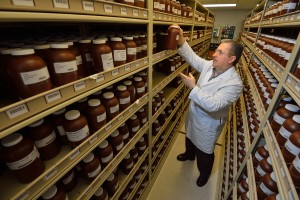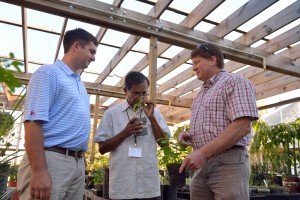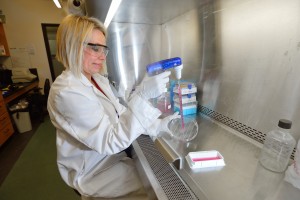
The National Center for Natural Products Research maintains a repository with more than 18,000 natural product specimens, derived extracts and pure compounds. Photo by Robert Jordan/Ole Miss Communications
OXFORD, Miss. – Since 1995, the University of Mississippi School of Pharmacy‘s inaugural research center has been setting the bar in the areas of natural products chemistry, botanical supplements development and marijuana research – and more.
“We’re delighted to celebrate the 20th anniversary of the National Center for Natural Products Research this year,” said Larry A. Walker, NCNPR director. “This is a wonderful opportunity to reflect on our growth and successes over the past two decades.”
The center was created to discover, develop and commercialize natural products as pharmaceuticals and agrochemicals. It is the only university-affiliated research center devoted to improving human health and agricultural productivity through the discovery, development and commercialization of pharmaceuticals and agrochemicals derived from natural products.
The center has grown significantly since its modest beginning. Organized under the umbrella of the pharmacy school’s Research Institute of Pharmaceutical Sciences, the NCNPR was authorized by federal legislation sponsored by Sen. Thad Cochran in 1988 and began operations in 1995.
“When we first occupied the north half of our building in 1995, I think we had 24 total people at that time,” Walker said. “I remember being uncertain about exactly how we would put together the funding pieces and grow the program. We had a few small grants and a number of great ideas, but we were definitely breaking new ground.”
Alice M. Clark, now the university’s vice chancellor for research and sponsored programs, became the center’s first director in 1996. Working with Walker, who was then associate director, Clark visualized the center’s infrastructure and began building the program from scratch.
The center’s early achievements fell into two categories, the first being research discoveries that advanced the science of medicinal plants and drug discovery and development, Clark said. The second were strategic advancements that led to new partnerships and growth.
“On a very basic level, our earliest goals were to put the people and resources in place to make scientific advancements that would lead to key strategic and sustainable partnerships,” Clark said. “On a larger level, the goal was to bring to life the center’s mission. A key factor in achieving this was the ability to leverage the faculty in the academic departments in the School of Pharmacy, and the support of these faculty members was essential.”
The USDA’s Agricultural Research Services moved its Natural Products Utilization Research Unit to the center in 1996. Stephen O. Duke was named research leader of the unit.

NCNPR staff members Robert Cooper (left), Lal Jayaratna and Ed Lowe examine medicinal plants at the center’s garden. Photo by Robert Jordan/Ole Miss Communications
“Over the years, university and USDA scientists of the NCNPR have synergized each other’s research in many ways,” Duke said. “This close partnership has enabled new avenues of highly successful research for both groups.”
The formalization of the previously established partnership was a major step for the center that paved the way for other federal collaborations.
“The center’s partnerships have resulted in many joint projects, publications, patents, technologies and knowledge that have advanced science and informed policy and consumer decisions,” Clark said. “And strategically, they have helped establish an environment that has led to the development of additional strong, productive collaborations.”
In 2001, Walker was named director. That year, the center launched its partnership with the U.S. Food and Drug Administration. It formally recognized the Center of Excellence on Botanical Dietary Supplement Research in 2006.
“The Center of Excellence has accomplished a great deal since its creation,” said Ikhlas A. Khan, director of the COE and associate director of the NCNPR. “We established a repository focused on medicinal plants and a ‘living collection’ of botanicals. We have also contributed research that has helped the FDA to make regulatory decisions.”
Training of FDA field inspectors is an important part of the COE. Several times a year, trainees attend workshops at the center that teaches about approaches toward verifying identity and quality of botanical supplements. To date, the program has trained more than 600 inspectors.
The COE has assumed a leadership role in bringing together experts from around the world to discuss issues related to medicinal plants and dietary supplements. In 2001, the NCNPR hosted the first International Conference on the Science of Botanicals. The annual conference has been instrumental in facilitating conversation related to botanicals among scientists, industry leaders and other parties.
The expertise that has developed within the center is unmatched.
“We have many special areas where we have a lot of knowledge, like in antifungal natural products, authentication of botanical supplements, research on developing drugs from marijuana, and research on the pharmacology of antimalarial drugs,” Walker said. “We have great resources with our repository and screening program. I would say that we likely have the largest critical mass of people in our discipline.”

Olivia Dale, senior research and development biologist, works in one of the center’s labs. Photo by Robert Jordan/Ole Miss Communications
One example of the center’s specialized knowledge is illustrated in the area of immunostimulants. David Pasco, NCNPR associate director, has worked extensively with a microalgae called spirulina that has been shown to boost the immune system when taken as an extract.
“We’ve found that the extract has an impact on joint pain and even skin elasticity,” Pasco said. “We hope to further investigate spirulina to see if it could support immune function in patients who are undergoing chemotherapy treatment.”
Today, with more than 100 people on staff including USDA employees, the center’s influence on natural products research can be felt near and far. That influence begins with the people that the NCNPR has trained, Walker said.
“I believe we’ve made an enormous impact in a global sense by training people in natural products chemistry and giving them experiences in the field,” Walker said. “These people are now working in industry, at the FDA and at universities all over the world. We have a kind of legacy from that and it’s amplified because these people tell others about us.”
David D. Allen, the pharmacy school’s dean and executive director of RIPS, applauds Clark and Walker for their leadership.
“(Drs. Clark and Walker) have championed the center over the years and led it to great success,” Allen said. “There are many reasons why I came to the University of Mississippi School of Pharmacy – one of them was undoubtedly the prestige of the National Center for Natural Products Research.”
The future brings a variety of exciting prospects, Walker said. From investigating marine natural products to developing FDA-approved botanical drugs, there is much to learn and discover.
“Broadly speaking, I think the most exciting thing is the potential that natural products have for impacting human health in the post-genomic era,” Walker said. “With our new understanding of the human genome and its expression, and of the complex signaling pathways that regulate it, we are finding new and exciting ways that natural products can prevent and treat disease.
“We used to think we were going to just design a drug, hit a certain target and cure the corresponding disease. Now we know – at least in many diseases like cancer and infectious diseases – that it’s not that simple. You have to take a broader approach. I think this is an area where natural products can play a role and we’re in a great position to make substantial contributions.”
NCNPR Milestones
- The NCNPR was authorized by Congress in 1988 and began operations in July 1995.
- Alice M. Clark was named the director of the center in the fall of 1996, giving the national research center its first permanent director. Larry A. Walker became director in 2001.
- In the fall of 1996, the south sections of the second and third floors of the center were completed and the space was occupied.
- In October of 1996, the U.S. Department of Agriculture – Agricultural Research Service’s Natural Products Utilization Research Unit began its work at the center. The partnership has produced numerous joint projects, publications and patents for the development and application of natural products for pharmaceutical and agricultural uses.
- The center’s partnership with the U.S. Food and Drug Administration launched in 2001. The partnership focuses on the development of standards for a broad range of herbal products commonly used in dietary supplements.
- In 2001, the inaugural International Conference on the Science of Botanicals was held. The annual event brings together scientists from around the world to discuss issues related to medicinal plants and dietary supplements.
- On September 23, 2005 the NCNPR celebrated its 10th anniversary. U.S. Sen. Thad Cochran delivered the keynote address.
- Planning for a new addition to the Thad Cochran Research Center began in 2005. Health Resources and Services Administration funding made planning of the new addition possible. The 250-seat auditorium expansion was completed by summer 2008.
- In 2006, the U.S. Food and Drug Administration established the Center of Excellence on Botanical Dietary Supplement Research.
- The Maynard W. Quimby Medicinal Plant Garden began constructing a new facility in 2009. The facility was dedicated in 2012.
- The center hosted the American Society of Pharmacognosy’s annual meeting in 2014.
- The Thad Cochran Research Center West Wing was dedicated in 2015. The building, which completes the two-building National Center for Natural Products complex, allows researchers to advance their drug discoveries to the commercialization stage. It is one of the most advanced facilities in the region.